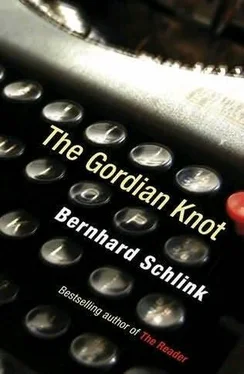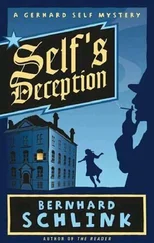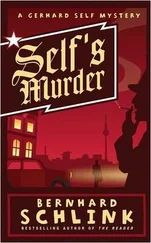“Where is that?” Georg shouted at Helen.
“Where is what?”
“On the screen! Where are those people sitting?”
He had seen Françoise, he had seen her face. The screen was now showing a family, a laughing fat man wearing a Yankees cap, and two black girls who saw the camera and waved, all within seconds.
“Those are just people here in the stadium.” She didn’t understand.
“But where in the stadium? Down there, over there? Where are the cameras?”
He jumped up and ran down the stairs. Françoise had to be sitting down below. The camera had shown seats that were almost at the level of the playing field. He tripped, nearly fell, caught himself, kept running. Aisles, handrails, ushers in red caps, blue shirts, and pants-this is where the better seats began. He jumped railings, climbed over the backs of seats of three empty rows, ran left to the next flight of stairs, and continued his descent. He had dodged an usher, but the usher had seen him. There were more stairs; he ran faster down to the next handrail, beneath which the seats were occupied. He wanted to turn left, to the continuation of the stairs, but he saw an usher there. On the right too. So he jumped over the railing where there was a free seat, made his way along the row, over the back of the next free seat, and then again, and down the stairs.
He came to the railing where the upper tier ended. The players and fans were far below. Had Françoise been wearing something red? A blouse? His eyes scanned the rows, saw red everywhere, barely able to tell women and men apart: jackets, sweatshirts, blouses.
“Françoise!” he yelled. People around him had noticed and, amused by his running and shouting, began to chime in, “Françoise! Françoise!”
When the ushers came, Georg followed them without a word. Not a single person in the lower tier had looked up. The ushers were friendly, asked to see his ticket stub, and escorted him back to the upper seats. Helen was waiting for him.
“I’m sorry, but I have to get down there.”
“We’re in the final inning. Unless there’s a miracle, the Indians will lose within the next two minutes.”
He wasn’t listening. “I’m really sorry, but I really do have to get down there,” he said. He walked over to the aisle. She followed him. “Is this about her? Did you see her? Do you love her so much?”
“Do you know how I can get all the way down? Down to the front rows?” He was walking faster, heading down.
“The game’s over, it’s over! Did you hear me?”
He stopped. The fans were clapping rhythmically, shouting “Yanks! Yanks!” And within seconds people were pouring into the aisles, and over the ramps and stairs.
“But I have to…”
“There are forty thousand people here.”
“Forty thousand in a stadium is still better than all the millions in New York,” he said stubbornly, but could no longer stop to reason with her as the stream of crowds carried them down the stairs and out onto the street. On the way to the subway, and down on the platform, he craned his neck and looked around.
“What would you have done if-” Helen began, “I mean, what would you do if you found her?” They were standing in front of Helen’s house, and she was playing with the buttons of his shirt.
He didn’t know what to say. He had imagined all sorts of things: a furious eruption, coolly walking out on her, a stormy or a dignified reconciliation.
“Do you want to get back together with her?”
“I…” he began, but fell silent.
“There’s not much prospect of success when one has to fight so hard for someone. Being back together might at first be heaven on earth. But then, how can she ever repay what you have suffered on her account? Why should she even want to repay it? Did she ask you to suffer?”
Georg looked at her downcast.
“Call me one of these days,” she said, kissed his cheek, and left.
Georg bought a beer and sat down on a bench in Riverside Park. He had no idea what to do, what his next step should be. Tomorrow, he told himself, tomorrow I’ll make up my mind. Or else things will figure themselves out. Perhaps patience is a virtue also when it comes to decisions. Perhaps things fall into place on their own.
THE FOLLOWING DAY GEORG took particular care with his disguise: the brown tanning color, the black hairspray, mustache, sunglasses, jacket, and tie. The previous day the redhead had turned up at a quarter past eight. Georg waited by the sports store. He saw the redhead arriving, crossed the street, and reached the door just as he did. The redhead looked pleasant enough: his face was scarred by acne, but he had clear blue eyes, strong cheekbones, and a broad smile. With his gray suit and buffalo-leather briefcase, he would have blended in at any investment bank or law firm. He looked at Georg blankly, though perhaps with a touch of curiosity, and rang the fourth-floor bell. Georg pressed the eighth-floor bell.
“Another hot day,” Georg said.
“Mm.”
The door buzzed. The floor of the hallway and the stairs were covered with gray construction paper. The woodwork and banisters had been sanded down, and a first coat of paint had been applied to the walls. Two wood planks were nailed across the missing elevator door.
“They’re still working on the elevator,” the redhead said. “You’ve got quite a climb.”
“At least I have company halfway.”
The construction paper covering the stairs was slippery. Above the third floor there was a new dark gray carpet, the walls were light gray, and the woodwork had been painted Bordeaux red. There was still a smell of fresh paint. On the fourth floor the redhead wished him a nice day and opened a heavy metallic door that bore no inscription. Georg continued climbing the stairs. On the fifth floor was an opaque brown-tinted glass door that read TOWNSEND ENTERPRISES in gold letters, and on the sixth and seventh floors there were again bare metallic doors. The door on the eighth floor stood ajar and he pushed it open.
The floor was unoccupied. Here, too, there was a fresh coat of paint, construction paper on the floor, ladders, and trestle tables. From a corner window he could see Union Square across tarred rooftops, and farther away the Twin Towers. The redhead probably knew that the eighth floor was empty. He might be suspicious.
Georg went down to the fourth floor and rang the bell at Townsend Enterprises. The door swung open with a soft click and he saw a large room, and on the wall an inlaid gold and bronze map of the world. The door fell shut behind him, and from a hall to the left a woman appeared in a pink blouse, a gray suit, with extravagantly pinned-up black hair and ugly pink glasses.
“Can I help you?”
“I was looking for the law firm of Webster, Katz, and Weingarten on the eighth floor. Do you know where they might have moved?”
“We’ve only been here for two weeks. I don’t know anything about previous tenants. Would you like me to check the phone book?”
“That’s very kind of you, but thanks all the same.” As he turned to leave, he saw her press the city of Lima on the map, at which the door sprang open. He also noticed to her right a spiral staircase in the corridor leading to the floor below.
He called Mr. Epp from a public phone.
“Do you know how I can find out what kind of company Townsend Enterprises is? It’s at 874 Broadway?”
“You could ask for a credit report.”
“Where?”
“I’ll do it for you. Call me back in a few hours.”
Two hours later Georg found out that Townsend Enterprises imported rare woods and precious metals, and that it had gone bankrupt six months ago and been taken over.
“Who took it over?”
Читать дальше












